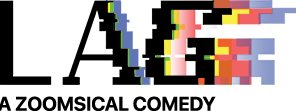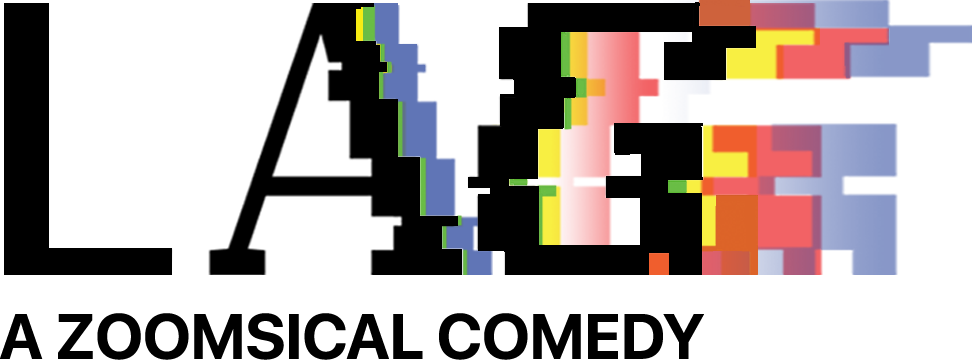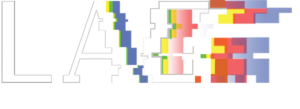Listen to and read an edited transcript of an interview by Lois Reitzes of WABE/NPR of Minka Wiltz and Haddon Kime about the creative and technical process.

LOIS
Life during lockdown has spawned additions to our language at a rapid rate as we look for new words to capture ongoing virtual activity. My favorite so far is “zoomsical”, which is not a frozen dessert, but promises to be a treat.
We’re going to hear more about a zoomsical now from actor singer Minka Wiltz and director/composer Haddon Kime.
Now, Haddon, would you please tell us what inspired you to create a Zoom musical or zoomsical?
HADDON
Well, at the end of March, as you know, there has been a big disruption, natural disruption to our industry. Ariel Fristoe at Out of Hand called and asked if there was any way that we could possibly write a new comedy that could be producible with the new social distancing rules in place.
And she gave me this challenge to write a musical comedy, and it HAD to be a comedy and it had to be producible with these new social distancing rules in place. It was a wonderful challenge to get right when everything else had stopped. I was about to open a show at the Alliance, and the season got pulled about a week before we were gonna go into tech. So I started down this path of creating this idea that here is a meditation and self care workshop or class that has had to make the move to Zoom, which is kind of our new theater in a way.
Zoom is a theater in itself, a proscenium, a digital proscenium. But it certainly is the way that a lot of stories are being told these days.
And they try to go about their job of meditating and performing self care rituals, breathing rituals to calm themselves down. But it all goes off the rails pretty quickly because of, you know, our “new normal.”
Of course, I thought of Minka immediately as someone I would love to write for. I’m a huge fan of her show Shaking the Wind last year at Out of Hand. It was one of my favorites. So, luckily she was available and we got to do this project.
LOIS
Minka, you wear several hats as a creative. How have you prepared to perform on this platform?
MINKA
It was daunting at first when I heard it, but I was excited. It was one of those things that I had to do it because it kind of raised the hair on the back of my neck. I had no concept of how to create it. It is such an odd idea to create with someone remotely. So I accepted the challenge and I was so grateful to be thought of, and to be a part of it.
I prepared by recognizing that I didn’t know what I was doing. But I did know as an artist exactly what my craft was. So no matter what the medium, I was ready to dive in and give it my best.
LOIS
What is the plot to “Lag: A Zoomsical”?
HADDON
Early on in the COVID-19 situation, a class on self care meditation has moved their practices that they usually do in the same room together, online.
So their breathing practices, their meditation practices. We are joining them in the final class, right as many things are changing for them in their lives and in their environments that are causing more chaos than usual and the hijinks ensue.
“Lag” is a metaphor for not just the technical glitches that sometimes happen with this video conferencing software, but also because our lives are lagging a little bit. Our bank accounts are lagging. Our plans are lagging. Our vacations are lagging. My child’s education is lagging a little bit, so there is a national lag going and instead of a (stage) musical. It’s on Zoom, so we just called it a zoomsical and maybe now they’ll be more than than one.
LOIS
How did you rehearse with everyone sheltering in place?
HADDON
They’re amazing professionals. I created a version of the show on audio where I sang all the parts. I emailed them a version where I sang ONLY their part, and I emailed them a version where I sang everybody else’s part but theirs. I also created sheet music for them to read along. So when I gave it to them, because they are amazing professionals, there was very quick turnaround.
We got together all together first on a Zoom call and talked about the show, what we were doing for our own self care during this time, you know, did a kind of a quick rehearsal. But the problem technically with a musical on Zoom, is there’s no way right now to hit go on a track and have all the actors sync up. There is this latency or this lag actually that happens.
We wanted to keep it as much in the theater domain as possible, even though we were being kind of forced on to film. Not that that’s a horrible thing, but the language is different. Film is a director’s medium, and theater is an actor’s medium. So, even though it looks like it’s all being performed in one take, actually they actually recorded all of their takes separately.
We did a first take all the way through to the edit, but to keep it an actor’s medium, we decided to show it to the actors, and then go back and do a second take so that the actors could decide if they wanted to evolve their performance in any way.
After seeing for themselves what the other actors had done, they did a second take and is what you’re seeing on Saturday when we premiere it. We were definitely making it up as we went along, but with respect for the craft, our actors, singers and being able to give them the agency to make as many choices as possible. And also, I’m a first time director, so I’m very happy to let them do that.
LOIS
Oh, well, congratulations. How many actors are in the show?
HADDON
There are four. We have a soprano, an alto, a tenor and a bass, and there’s a lot of mixing between those. The ranges on our performers is amazing.
LOIS
When you were talking about directing each actor and then bringing them together. Do I take it then that there is no ensemble singing for each performer, each performer is singing his or her own song?
HADDON
Yes, each performer sings their own part, but there is very much ensemble singing. We have harmonies. We even have a fugue.
There is a part in the show where everybody is itching to just let it all out. And so how do you do that when you have in this case, three people wanting to sing all of their frustrations at the same time? The only way I could figure that out was to go back to like a 17th century fugue where the counterpoint musically is independent, but working in harmony. They all sing their frustrations about COVID-19 at the same time. It’s called the “Quarantine Fugue” and it was very fun to shoot. We shot it independently, each line, one at a time and then put it together off-line in editing software. It syncs up beautifully.
MINKA
It was great. I was amazed. I was just listening and remembering how that portion of the piece kind of blew my mind when I was first introduced to it. For me, it was helpful to hear the music being primarily, first and foremost an opera singer or a singer. I’m used to hearing things first before I visualized them, sometimes, especially in musicals. And so sometimes that’s easier for me to plug in.
But I had. But I have spoken parts during the fugue and I have reactions. So I got a chance to be the audience. I had to pretend like I was annoyed. But I was really enjoying it the whole time because it was so well done. And hearing it come together, it really made a believer in me the power of music being able to coalesce. No matter where we are, you know, and that is really exciting.
LOIS
So this zoomsical will not be live?
HADDON
This zoomsical will not be live. We we would have loved to have done it live. And we’re hoping the technology can catch up with this latency problem. In theater, you play sound cues, and everybody hears them at the same time. We can’t do that right now with music on Zoom, at least as far as I know. I’ve talked to some amazing technicians on Broadway and they’re all trying to figure that out right now. They’ve figured it out for plays, but for musicals… yet.
LOIS
Well, but, you know, look at how I’m shaking my head with frustration as you’re speaking. I’m thinking, oh, come on! Do we we have to wait for that half second lag? Then the little angel above my head is saying, Lois, look at we are able to experience here and and how quickly we forget the marvel of this technology that that we can even enjoy entertainment, that we can’t even experience communication this way.
HADDON
That’s so true, Lois. Like I said before, we’re being disrupted as a as an industry right now. We’ve lost our audience. And I mean, as a theater person, like, I love a live audience. I love crowds. I love getting together. At the same time, we also have this opportunity. So maybe it’s the devil and angel metaphor again. We have this opportunity because now we have a new theater and it’s only going to exist for a limited time.
I truly believe Broadway will be king again. You know that that crowds will return and that people miss getting together right now in big ways and are are itching to do so. Theater is a wonderful place to do that and experience things together. But for this limited time, we kind of have a decentralization going on where the big cities of, say, New York and Chicago or London, cities with ultra large theater scenes are interested in what to do now just as much as anybody here in the theater scene in Atlanta or Minneapolis or in in Seattle or San Diego.
Well, what are we gonna do? Let’s all find a way to do this. We’re gonna have to do it together online with using these new this new theater of Zoom. So there, you know, with every challenge, there’s this great opportunity. And I think it’s going to last for a limited time.
So here’s our here’s here’s the thing we’re going to throw into the ring as as a possibility as our our zoomsical here from Out of Hand Theater with the great Minka Wiltz.
LOIS
Yes, it’s great, and it’s so optimistic being a glass half empty sort. I have been so sad with everything for lately about how long it seems it will take before we can go out there in live theater settings and life concert hall settings together again.
But you are absolutely correct, not only in. Saying that this provides a great platform. But look at how smaller organizations such as Out of Hand are experiencing the same challenges as The Alliance or Broadway Theater or the Metropolitan Opera House. I mean, everyone has to consider that people can’t sit that close to one another. You can’t have the bottlenecks of people getting in in line to enter the theater. So is this a good thing for now, but can you earn a living with this?
MINKA
Well, could we earn a living before this?
(laughter)
Something that I’m grateful for, is having a partner in my life, a life partner who is able to help sustain me. But a lot of people don’t have that. And I’m also grateful for the communities that have mushroomed up to show support for artists all over the country. But specifically in Atlanta, seeing how people are rallying around one another.
I am finding that as an artist, I am not earning more resources in in terms of monetary acquisition, but I am gaining in the resources of understanding the value of my creativity and the value of other creatives around me. One thing that I do think about every day is what can I do to ensure that I’m creating content that will be able to be monetized eventually? And that keeps me strong in my heart and my mind.



